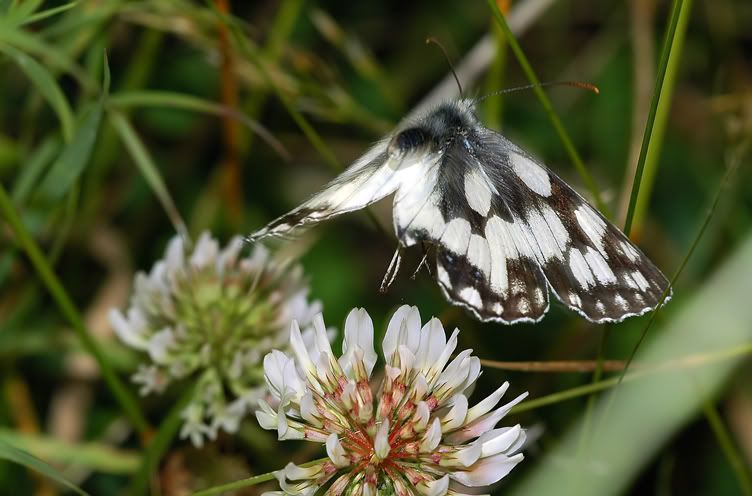Page 1 of 1
Marbled White and Shutter Noise?
Posted: Tue Jun 26, 2007 5:38 pm
by Bryan H
I first noticed this behaviour last summer, which prompted me to silence the audible bleep when my camera confirms autofocus on my chosen subject. However just a few days ago...
My first five attempts at photographing Marbled White resulted in the butterfly departing the scene. This coincided with the sound of the shutter mechanism. Ah well, I thought: light travels a lot faster than sound so my image should be safely 'in the can' long before the sound of the shutter reached my butterfly. Not so! here's a typical result:

My guess is that the shutter mechanism must generate most of its noise before the shutter actually opens? However...these first five shots were of two or three different individuals. I then took about twenty 'successful' shots of various individuals, using the same shutter speed. Not once did the shutter noise frighten off the butterfly!
Even though I may be missing something obvious here, this only seems to happen with Marbled White.
I realise there are many greater mysteries in life, but has anyone had the same experience or able to offer an alternative explanation?
Bryan
Posted: Wed Jun 27, 2007 8:09 am
by Dave Mac
I've noticed that the noise made by the auto focus lens motor can scare them if they are particularly twitchy. This can be exacerbated if the lens is set to auto focus “tracking” mode where the focus is continually adjusted if the insect moves or the centre spot is moved to different areas of the butterfly
Cheers
Dave
Posted: Wed Jun 27, 2007 1:57 pm
by Dave McCormick
I have noticed that the lens focus can scare some species too. I noticed this when trying to get a pic of a small tortoiseshell. Heck, I did manage a good shot of one with my earphoes and music on and it did not really flinch.
Posted: Wed Jun 27, 2007 10:57 pm
by JKT
I have not noticed it with Marbled Whites, but trying to photograph Woodland Browns was a real pain. I don't use autofocus, so that was not the problem, but the sound of the mirror lifting did the trick. The shutter follows closely afterwards, but not fast enough, it seems. Also, the Canon 20D has notoriously loud mirror mechanism.
Noise...
Posted: Wed Jul 04, 2007 8:29 am
by NickB
I too have noticed that some (tho' not all) of my subjects seem to respond to the autofocus or shutter "beeps" - but there seems to be no real pattern to this! I guess they are just sensitive to vibration.
I also noticed that whilst wearing my red fleece, the Large Skippers I was photographing did not seem to mind, but when I changed to the Small Skippers, they seemed not to like my presence near at all! Do all butterflies have the same (colour) vision??
Posted: Wed Jul 04, 2007 9:14 am
by eccles
Lens a/f and image stabilisation noises are often quite high frequency. I suggest that insects react to these the same way as they would to bats' echolocation noises. Moths, even day-flying ones, are more susceptible than butterflies in my experience. It must depend on the camera/noise in question though as I have never had such a problem with marbled whites. These are alert when basking but easily approachable when feeding, especially from their favourite knapweed.
Posted: Wed Jul 04, 2007 11:53 am
by Bryan H
Thanks all for your replies.
It seems that there are quite a few factors at play here. Come to think of it, the basking/feeding behaviour might have been significant in this case. And that's not to mention the different behaviours of individual butterflies or the guile of the photographer - perhaps I just needed a bit of warming up before getting into my stride!
The effect of the mirror 'slap' before the shutter opening just goes to show how quickly these creatures are capable of reacting.
Bryan
Posted: Wed Jul 11, 2007 7:01 pm
by steveh
I too have recently noticed how "flighty" Marbled Whites can be.
At the time of pressing the shutter he was flat out on the clover!
I was also fascinated at how the legs are so low compared to the abdomen in initial take off.

Posted: Wed Jul 11, 2007 8:54 pm
by Bryan H
Steve, that's a spectacular image!
My guess is that the abdomen is being used as a both a counterbalance to the power generated by the butterfly's wings and also as a rudder, whilst the legs have now expended their purpose during launch. I assume, much like an aircraft, the legs are fully retracted in flight (?)
What I also notice is that the atennae are turned back towards the 'threat', as if monitoring the situation. And all this in a timescale of milliseconds!
Bryan


